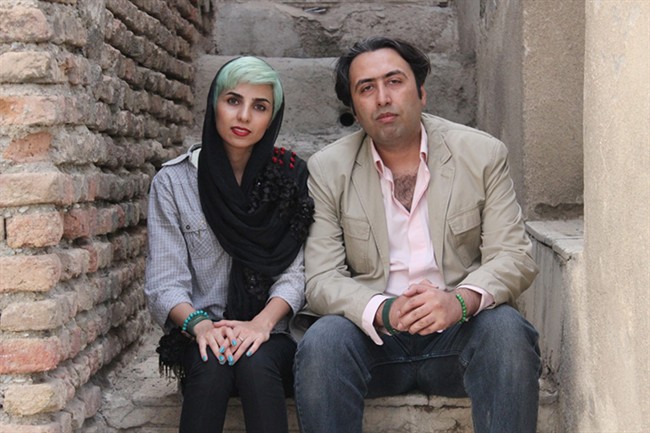DUBAI, United Arab Emirates – Two Iranian poets jailed for their work and sentenced to 99 lashes apiece for shaking hands with members of the opposite sex are the latest targets in a crackdown that analysts say pits hard-liners against those offering new glimpses of life in the Islamic Republic.

The sentences follow a pattern of arrests and convictions targeting activists, journalists and artists that has served as a grim backdrop to President Hassan Rouhani’s efforts to soften the country’s image and improve relations with the West, including through the landmark nuclear agreement reached last summer.
Hard-liners in the police, judiciary and military view any rapprochement with the West as a threat to the Islamic Republic and a sign of moral decay. Rights groups and analysts say those targeted in the ongoing crackdown on expression in Iran also serve as pawns in the hard-liners’ struggle with moderates ahead of February’s parliamentary elections.
“I think people thought with the nuclear deal, there would be sort of a bit of a thaw as well or a bit of an opening up,” said Karin Deutsch Karlekar, the director of Free Expression Programs at PEN America, an organization promoting literature and freedom of speech. “I think the judiciary is sort of pushing back and trying to make clear that there isn’t going to be that opening people were hoping for.”
Fatemeh Ekhtesari, a practicing obstetrician, and Mehdi Mousavi, a trained doctor who teaches literature and poetry, were first arrested in December 2013, months after Rouhani took office. Earlier this month, Ekhtesari received an 11 1/2-year prison sentence, while Mousavi got nine years on charges ranging from propaganda against the state to “insulting sanctities,” as well as the lashings, according to PEN.
- L.A. wildfires: U.S. asks Canada for resources as provinces send aid
- Trump hush money sentencing to go ahead as U.S. Supreme Court rejects delay
- Los Angeles wildfires: Alberta plans to send water bombers, other resources to California
- Ex-FBI informant who fabricated bribery story about Biden, son gets 6 years in prison
Iran always has restricted the arts, but both writers previously had published books of poetry with the permission of government censors. Karlekar said the judiciary was waiting for a case where it could “make a demonstration and send a message by giving a very, very harsh sentence.”

Get daily National news
Neither Iranian officials nor state media have commented on the poets’ sentences, the latest in a series of similar cases. One of Iran’s best-known human rights activists, Narges Mohammadi, was arrested in May and remains in custody.
Perhaps the best-known case outside of Iran is that of Washington Post journalist Jason Rezaian, a dual U.S.-Iranian citizen who has been detained in Iran for 14 months and was recently convicted on charges that include espionage. He reportedly faces up to 20 years in prison. The U.S. government, the Post and rights groups have criticized Iran’s handling of the case and called for his release.
At the end of last year, at least 30 journalists were held in Iranian prisons, including Rezaian, according the New York-based Committee to Protect Journalists. Others have been detained since, and in August state media accused a senior Wall Street Journal reporter who once served as a correspondent in Iran of conspiring against the government. The Journal called the claims “completely false, outlandish and irresponsible.”
Sherif Mansour, the Middle East and North Africa program co-ordinator for the Committee to Protect Journalists, said reporters often get targeted because they are “much easier to frame” as spies.
“There is a fine line that people … in democratic societies are accustomed to. The role of the journalist is to gather information, including those related to public officials,” Mansour said. “What they are trying in Iran is to blur that line.”
The crackdown has targeted artists as well. In May 2014, authorities arrested a group of young Iranian men and women for a video of them dancing to Pharrell Williams’ song “Happy.” While the arrests drew widespread criticism, including from the musician himself, those involved each received suspended sentences of six months in jail and 91 lashes.
In June, a court handed cartoonist Atena Farghadani a 12-year, nine-month sentence, in part for depicting Iranian parliament members as monkeys, cows and other animals. The cartoon was criticizing a draft law restricting contraception and criminalizing voluntary sterilization, according to Amnesty International.
This month, a court sentenced award-winning Iranian filmmaker Keywan Karimi to six years in prison and to 223 lashes over his films, which authorities also said were “insulting sanctities.”
The crackdown represents the “continuation of the paranoia that the intelligence services and the judiciary has been having all along,” said Haleh Esfandiari, an Iranian-American dual national who was detained by Iranian authorities in 2007.
“They are now trying to frighten a lot of people who are inside Iran – (aid groups), journalists, poets, bloggers, Internet users. They are trying to warn them that, ‘Make sure you think twice if a foreigner gets in touch with you and reaches out to you,”‘ said Esfandiari, a fellow at the Washington-based Wilson Center. “They are scared of the possibility of a soft revolution.”
Mousavi and Ekhtesari may have been targeted because their work is known abroad. Both are self-described “postmodern Ghazal” poets who seek to revive the traditional Persian love sonnet by applying it to contemporary political and social issues. One Mousavi poem, entitled “Scared of…,” touches on the paranoia felt by many today in Iran.
“What if there’s a microphone in my clothes?
What if this text message is being registered?
What if my cry over the phone is being recorded?”







Comments